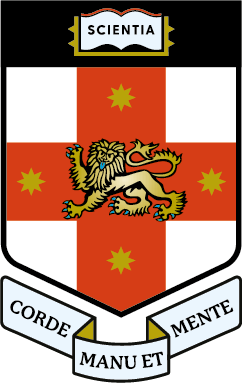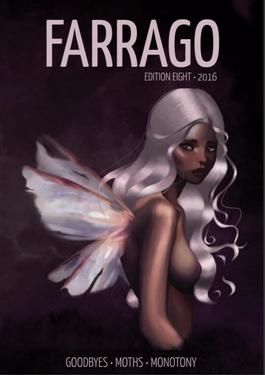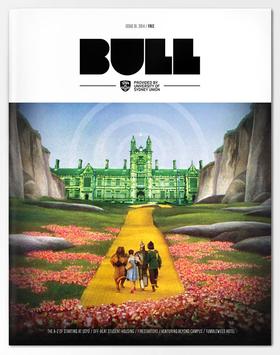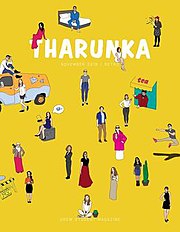
The University of New South Wales (UNSW), also known as UNSW Sydney, is a public research university based in Sydney, New South Wales, Australia. It is one of the founding members of Group of Eight, a coalition of Australian research-intensive universities. It is ranked 19th in the world in the 2024 QS World University Rankings.
Tertangala is the student magazine of the University of Wollongong. It is published by Wollongong Undergraduate Students' Association, and Tertangala is older than the university itself.
On Dit is a student newspaper published fortnightly during semester time, funded by the Adelaide University Union and advertising. Founded in 1932, it is the third oldest student newspaper in Australia along with Semper Floreat, which was first published in the same year. The paper replaced the Varsity Ragge which ran from 1928 to 1931, ending because of what On Dit described in its first edition as 'student apathy'. The Varsity Ragge returned in 1934 for a single edition as a rival to On Dit.

Philip Baxter College, University of New South Wales is a residential college at the University of New South Wales in Kensington, Sydney, Australia. Phillip Baxter College and its two neighbouring Colleges, Goldstein and Basser, are collectively known as the Kensington Colleges. Philip Baxter college is the largest of The Kensington Colleges. Residents generally stay in Baxter for two or three years before ending their college tenure. A student had to remain at College for two and a half years, to be named Honorary College Valedictorian. Residents are provided with three meals per day during session at the nearby Goldstein Dining Hall, which is shared with residents of the other Kensington Colleges - Basser, Goldstein and Fig Tree Hall.

Honi Soit is the student newspaper of the University of Sydney. First published in 1929, the newspaper is produced by an elected editorial team and a select group of reporters sourced from the university's populace. Its name is an abbreviation of the Anglo-Norman phrase "Honi soit qui mal y pense", meaning "shamed be who thinks evil of it".

Australia's universities are home to a variety of different student union groups, providing a range of political, commercial and other services to students. The sector has undergone substantial change in recent years, with a decline in participation, intervention by university administrations, and the end of compulsory membership arrangements.

The University of Sydney Union (USU) is Australia’s largest independent student-led member organisation located at University of Sydney in Camperdown, New South Wales, Australia.

Farrago is the student publication for the University of Melbourne in Melbourne, Australia published by the University of Melbourne Student Union. It is the oldest student publication in Australia. It was first published on 3 April 1925.
Grok Magazine is an Australian free student magazine. The magazine is written and produced by Curtin University students and published by the Curtin Student Guild. The magazine was started in about 1970 and named after a word indicating deep understanding that was introduced in Robert Heinlein's novel Stranger in a Strange Land. In 2009, five issues were published, and approximately 10,000 copies distributed per issue. These are distributed on the Curtin Bentley campus in Western Australia, as well as to many street location across the Perth metro area.
Richard Clive Neville was an Australian writer and social commentator who came to fame as an editor of the counterculture magazine OZ in Australia and the United Kingdom in the 1960s and early 1970s. He was educated as a boarder at Knox Grammar School and enrolled for an arts degree at the University of New South Wales in Sydney, Australia. Australian political magazine The Monthly described Neville as a "pioneer of the war on deference".
Vertigo is the student magazine of the University of Technology, Sydney. Its name derives from the university's main building, which is a 28-storey brutal modernist tower block, and how the Vertigo Offices were originally at its summit. Vertigo is published by the UTS Students' Association (UTSSA).
Metior Magazine or METIOR is a student publication of Murdoch University in Perth, Western Australia. Metior is funded by the Murdoch University Guild of Students but remains independent. The name is an acronym for "Murdoch Empire Telegram Indian Ocean Review".
Opus is a student newspaper published at the University of Newcastle, Australia by the Newcastle University Students' Association (NUSA). Opus was founded in 1954 by then economics lecturer Cyril Renwick, at what was then the Newcastle University College of the University of New South Wales, in the Newcastle suburb of Callaghan. Renwick proposed a student journal to promote student unity and expression. Teaming up with his secretary's husband, George Kirkby, the first edition of Opus was a four-page broadsheet newspaper replete with the refinement and formality of 1950s journalism.

Graeme Clement Dunstan is a prominent Australian cultural and political activist. A graduate of Essendon High School, Graeme matriculated in 1960 as dux with honours in maths, physics and chemistry. He is an engineering graduate of the University of New South Wales (UNSW), where he was President of the Students' Union (1967) and twice co-editor of its newspaper, Tharunka,.
Campus Experience is the student organisation at Macquarie University and is a wholly owned subsidiary company of the University. The organisation manages Macquarie University's non-academic services of food and retail, entertainment, sport and recreation, student groups, child care and student publications. The organisation also houses an elected student representative council.
AustLit: The Australian Literature Resource, is the national bio-bibliographical database of Australian Literature. It is an internet-based, non-profit collaboration between researchers and librarians from Australian universities, housed at The University of Queensland (UQ). The AustLit database comprises a comprehensive bio-bibliographical record of Australian storytelling and print cultures with over 1 million individual 'work' records, and over 75 discrete research projects.
John M. Green is an Australian businessman, thriller writer, and philanthropist.

The Saturday Paper is an Australian weekly newspaper, launched on 1 March 2014 in hard copy, as an online newspaper and in mobile news format. The paper is circulated throughout Australian capital cities and major regional centres. Since its launch The Saturday Paper has maintained a focus on long-form journalism and in-depth coverage of current affairs, arts and Australian politics.

BULL was the student magazine of the University of Sydney in Sydney, Australia, and was published by the University of Sydney Union. Established as The Bulletin, then The Bull, BULL was the union's only high-gloss magazine and was published monthly by an editorially independent student team.











